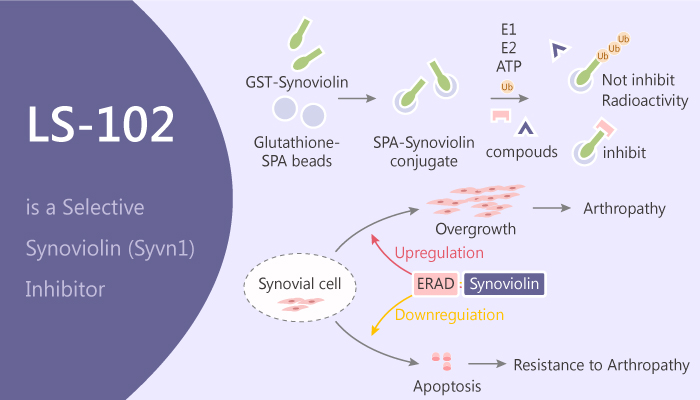Rheumatoid arthritis (RA) is the most common chronic inflammatory joint disease, affecting many people in the industrialized world. Synoviolin (Syvn1) is highly expressed in synoviocytes of patients with RA. Overexpression of Syvn1 in transgenic mice leads to advanced arthropathy caused by reduced apoptosis of synoviocytes. Blocking the function of Syvn1 could be clinically beneficial in RA patients. In addition, Syvn1 ubiquitinates and sequesters the tumor suppressor p53 in the cytoplasm, thereby negatively regulating its biological functions in transcription, cell cycle regulation, and apoptosis by targeting it instead for proteasomal degradation. Therefore, Syvn1 regulates apoptosis in response to ER stress as well as p53-dependent apoptosis. Syvn1 is an E3 ubiquitin ligase in endoplasmic reticulum-associated protein degradation. In this study, LS-102 is a Syvn1 inhibitor. It inhibits the autoubiquitination of Syvn1 with an IC50 of 35 μM. It represses the proliferation of RSCs in a Syvn1-dependent manner.

LS-102 inhibits HeLa cell growth only at very high concentrations (IC50=32.7 μM). However, the treatment of rheumatoid synovial cells (RSCs) with LS-102 suppresses synovial cell growth dose-dependently. Thus, LS-102 inhibits the proliferation of RSCs. Furthermore, LS-102 inhibits Syvn1 activity in dose-dependent (IC50=35 μM) in an in vitro ubiquitination assay. Thus, LS-102 inhibits the autoubiquitination of Syvn1. In addition, LS-102 reduces clinical severity scores in a CIA model. LS-102 suppresses polyubiquitination of target proteins of Syvn1, including nuclear factor erythroid 2-related factor 2 (NRF2), V247M α-sarcoglycan mutant, and PGC-1β.
In summary, inhibition of Syvn1 is a potentially useful approach in the treatment of rheumatoid arthritis. LS-102 is a selective E3 ubiquitin ligase Syvn1 inhibitor and inhibits the autoubiquitination of Syvn1. Importantly, it has the potential for rheumatoid arthritis treatment.
Reference:
Yagishita N, et al. Int J Mol Med. 2012 Dec;30(6):1281-6.